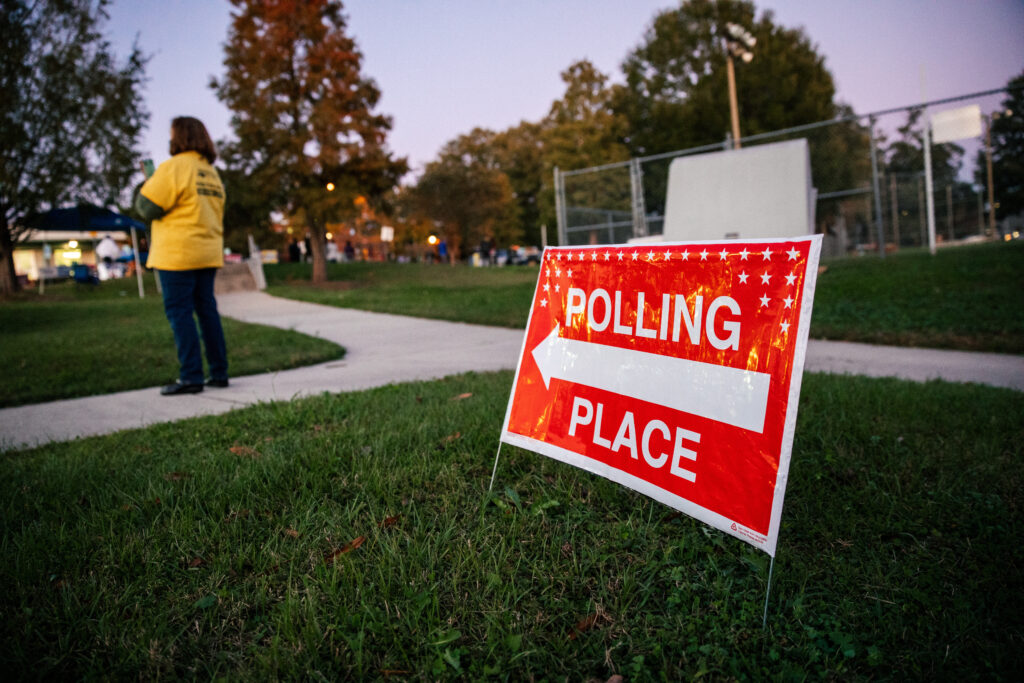At Washington Hearing, NC GOPer Praises Bipartisanship While Cutting Voting Access at Home

A Republican member of North Carolina’s elections board sang the praises of bipartisanship at a U.S. Congressional hearing on elections Tuesday, despite working in recent months to shift the state’s voting rules toward the GOP.
At a hearing of the Elections Subcommittee of the House Administration Committee on how election officials can respond to natural disasters, Stacey Eggers IV noted how important it was that the board acted in a bipartisan manner after western North Carolina was hit by Hurricane Helene a month before the 2024 election.
Eggers praised “the bipartisan nature of how my colleagues on the state board of elections and the respective county boards came together to take emergency action that addressed the needs of the voters with minimal political gamesmanship.”
“It was a good showing of the American spirit of coming together in the wake of a disaster,” Eggers later added.
North Carolina’s GOP-dominated legislature last year pushed through a bill to transfer the power to appoint election board members from the governor, a Democrat, to the state auditor, a Republican, after the 2024 elections. The result was to give Republicans a 3-2 majority on the board.
Since then, the North Carolina board’s GOP majority has set to work making the state’s voting rules friendlier to Republicans. Eggers, who has been on the board since 2018, joined the other two Republicans in voting to oust Karen Brinson Bell, a respected nonpartisan election administrator who also testified at Tuesday’s hearing, as the board’s executive director. She was replaced by a GOP operative who served as the top lawyer to the Republican House Speaker.
The board recently approved a deal with the U.S. Justice Department that could lead to tens of thousands of voters being disenfranchised unless they can provide additional information.
Democrats on the congressional panel emphasized how climate change had made running elections harder. “A recent report found that last year there were 27 individual weather and climate disasters with at least a billion dollars in property,” said House Administration ranking member Joseph Morelle (D-N.Y.). “Unfortunately, the administration continues to deny the climate crisis, denying science and actively impairing our readiness to respond.”
President Donald Trump has taken an ax to Federal Emergency Management Agency (FEMA) in his second administration, saying at times that he wants to shutter the department completely. Since Trump took office, FEMA has lost more than a third of its staff, disaster response times have slowed, and long-serving senior officials have continued to leave the agency. A Government Accountability Office (GAO) report issued Monday found that the government improperly impounded FEMA funds against congressional budget authority.
Hurricane Helene had some observers worried that many voters in western North Carolina would be effectively disenfranchised. Ultimately, the region outvoted the rest of the state by two percentage points, said Bell, thanks in large part to quick emergency aid.
“Without North Carolina emergency management and FEMA’s swift action, critical needs would have gone unmet,” Bell said. “In one week, all county offices reopened — no equipment damaged, no ballots lost, and most importantly, no election workers’ lives lost. By October 17, 76 of 80 planned early voting sites in the 25-county disaster region opened on schedule with power. By Election Day, the vast majority of sites were open with little consolidation and no isolated communities unserved.”
Florida’s Republican Sec. of State, Cord Byrd, emphasized the need for flexibility, saying “there is no one size fits all approach.”
“The executive orders created a streamlined process for displaced voters to have their vote by mail ballots sent to where they were living after the storms,” he said, referring to emergency orders issued by Gov. Ron DeSantis (R) after hurricanes hit in 2024. “It also gave supervisors the ability to relocate or consolidate polling sites or early voting sites.“
The three election administrators also agreed that preparation in advance was critical to pulling off elections.
“Disaster response begins long before an event. Careful planning allowed us to act quickly when Hurricane Helene hit western North Carolina,” Bell said. “Preparedness meant adopting an all hazards approach. We trained for the unexpected and embraced the philosophy, we don’t stop an election. We figure out how to proceed.”
Elections in the U.S. are underfunded, experts across the country and across party lines say. A survey by the Brennan Center for Justice in the spring found that 60 percent of local election officials are concerned about federal funding cuts to election security programs.
To address those needs amid the increase in extreme weather, ranking member Morelle announced the introduction of the Climate Resilient Elections Act on Tuesday.
The text of the bill is not yet available, but according to a fact sheet from Morelle’s office the act would authorize $100 million in grants for election-related disaster preparedness and require election administrators to develop comprehensive plans for natural disasters. It also would direct the GAO to study other support the federal government could offer and how natural disasters affect voter registration.
Morelle is introducing the bill with three co-sponsors, the other Democrats on the Administration Committee: Representatives Terri Sewell (Al.), Norma Torres (Calif.), and Julie Johnson (Tx.). It’s also been endorsed by the League of Conservation Voters, Southern Poverty Law Center, and the League of Women Voters.